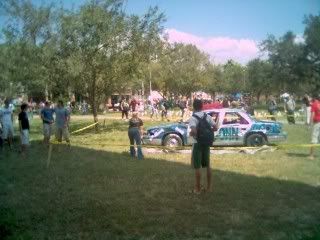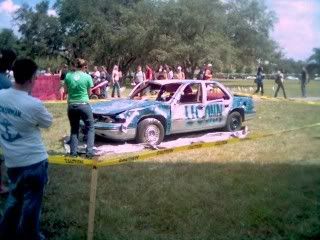If I ever had to move to a different country. If the political or social situation ever became so intolerable that I just *had* to get out of the United States, at least on a semi-permanent basis and become a citizen of a different country... I think Iceland would very easily be where I would go. Sure they have the volcanic activity of Hawaii, and the earthquakes of California, and the country nearly touches the Arctic Circle... but really, I'm quite convinced that despite all this, it's a very good place to be. Aside from the occasional bit of inclement weather, I've never read a negative thing about Iceland. And all the archaeological sites I could ever want to see are all there... Laugar, Gudrun Osviffsdottir's childhood home, most especially. (Side note that I can't resist: Laugar means "bath" or "hot spring," so named for the natural hot springs that Gudrun, her family and the surrounding farms used to wash their clothes and bathe every Saturday (Vikings were actually some of the cleanest people in Medieval Europe...). Oh, and since it comes up below, but isn't translated "holt" essentially means "farm.")
And, joy or extreme joys, the University of Iceland now has a MA program in Medieval Icelandic Studies taught in English due to popular demand. I'm
ecstatic! Now if I want to go to Europe for what will probably have to be a second MA at some point, I have two European options: Uppsala University (MA in Viking Studies) and the University of Iceland, which would be my first choice on location. Both are interdisciplinary programs... But I'll have to look into that when I have more time.
Right now, here was the main purpose of me beginning this post before I got distracted by unexpected results to my research, reproduced here for your convienence, this facinating little address given by Magnus Magnusson, who translated the Laxdaela Saga into English. If you get it, you may be able to understand why I've become so obsessed with Iceland ever since reading the Laxdaela Saga.
"A Xenophile's Guide to Iceland – the Icelandic nation's heritage and culture" Address by Mr. Magnus Magnusson KBE, BBC television personality
Fifth Consular Conference in Reykjavik, 2-5 September 2001
4 September 2001
Good morning! Thank you for these kind words. Now, for your honorary council exam you no doubt all studied this little booklet which is called "The Xenophobe's Guide to the Icelanders". Invaluable, and totally incorrect information about Iceland. It's part of the Xenophobe's series designed for good-natured fun at the foibles of the various nations which are the object of the Xenophobe's irreverent interest.
Now, this Icelandic squib contains every old joke about Iceland I have ever heard, apart from one, which will bring joy to the heart of Gordon McKee, from Newcastle upon Tyne. "What do you do when you get lost in a forest in Iceland? Answer: you stand up." Now this is a joke which the Icelanders themselves invented and which they tell at every opportune and inopportune moment, so this morning I thought I'd entitle my short address: "A xenophile's guide to Iceland."
There is an old Icelandic proverb, that I've just invented, which says "It is best to think aloud and speak in silence". And that's what I am going to do. I want to think aloud, and to speak in silence about Icelandic culture and the Icelandic cultural heritage, and I would like to deal with it under three headings: land, living and language.
Let's take the land first. You know, when you live in a country which moves alarmingly under your feet every five years or so with an earthquake or a volcanic eruption, you face, like the saga heroes of old, with a choice of two courses of action, neither of them good: Either to flee the country and all its hazards, or to stay and brave them out.For more than 1100 years the people of Iceland have chosen to stay and brave them out. The elements have seldom been friendly, conditions have often been intolerably harsh. Merely to survive has been a desperate and chancy business in itself.
Iceland, as the late Victor Borge used to say, is a little, big country, it's a very large island with a very small population, just over a quarter of a million people, which is even less than Newcastle upon Tyne. But it has never been an insignificant, or an isolated, or a primitive place. Over the centuries the Icelanders have harnessed the hostility of the elements and turned foe into friend. And from successful defiance of hazard there has come a profound sense of achievement. Iceland through its short history as a key outpost of European culture has always had to think very hard about its own "raison d'étre". And I believe myself that coping with hazard down the centuries has given the Icelanders a privileged place in the development of ideas, ideas about cultural identity, ideas about the way to cope within environment, as we were hearing just now. Ideas indeed about the nature and the purpose of humanity.
People have frequently thought aloud, about what on earth the early Icelanders saw in this place; why emigrate to Iceland, for heaven's sake? In the sagas, Norwegians frequently referred to Iceland, "that wilderness, or that desolate skerry", but that was before they emigrated and became successful pioneers here. The name didn't help, of course. One of the first explorers, a picturesquely named viking adventurer known as Ravens' Flóki, had a bad time when he arrived, and after a very severe winter he left in disgust, shaking his fist and shouting: "Bah, bloody Iceland", and the name stuck.But he was wrong, of course. The name he dumped on our fair land, was a gross misnomer. Luckily he had two companions with him who redressed the balance for us. One of them said, "It has it's advantages as well as disadvantages", and the other said, "Butter dripped from every blade of grass". Well, up to a point, anyway.
But we know that the mean temperature in Iceland in the first centuries of settlement was higher than it is today by an average of about one degree centigrade, and at this latitude a single degree makes a world of difference.
Certainly, the early settlers found here a promised land of tremendous potential, whose natural resources they exploited with vigour and resourcefulness. In those days Iceland was of course a commonwealth, an independent republic, her outlook was expansive, international, cosmopolitan. Her medieval literary culture was uniquely Icelandic, but in no way isolated nor insulated from all the best intellectual and humanistic ideas from Europe, in science, in philosophy and in general erudition.In the world of commerce, our fish products were prized all over the continent but in the later Middle Ages, after losing our independence and becoming a colony of Denmark, Iceland lapsed into a kind of numbed inertia, almost crushed by colonial oppression, and natural disasters. Late in the 18th century there's even talk of evacuating the surviving Icelanders, 40,000 impoverished people, evacuating them from Iceland and resettling them on some moorland in Denmark.
But Iceland and the Icelanders survived and survival has always been the name of the game in Iceland, and after survival comes revival. Let me just illustrate. As you all know, Saturday in Iceland means bath night. The word for Saturday is "laugardagur", hot spring's day. Now, hot springs were the most striking aspect of the new country the Norsemen discovered late in the 9th century. When the first settler, Ingólfur Arnarson, had thrown the hallowed carved pillars of his ancestral high seat overboard within sight of land as ambassadors, as consuls you might say, of peace for the land spirits who would meet them.
He eventually found them on the shores of a wide, sheltered bay riddled with steaming hot springs, and so he named it, ReykjavÃk, "smoky bay". A coincidence of history would later make it the capital of Iceland, and 20th century geothermal technology would also make it ironically the only smoke free captial in the world.
The early Icelanders knew all about the importance of the hot springs. In Laxdæla saga, for instance, we read of the naturally heated swimming pool at Laugar in Sælingsdalur where Kjartan Ólafsson wooed the imperious Guðrún ÓsvÃfursdóttir at the start of their ill-starred love story. And as we'll see when we visit Reykholt tomorrow, "reyk", there's that smoky "reyk" prefix again, the great 13th century saga-historian Snorri Sturluson built himself a circular, open air heated bath there, and here, we are told, he and his cronies would sit, turning on and off the hot and cold water with their toes, gossiping about people and politics, the original think tank you'd say.
It's still there and the underground passage which led to his house has now been beautifully excavated and restored along much of its way. There was no development of this for centuries. It is not until the year 1911 that an ingenious farmer, named Erlendur Gunnarsson of Sturlureykir, near Reykholt, became the first man to try to harness all this abundant geothermal energy for heating his home, and cooking his food.
Why did it take so long for this development to happen? Well, the main obstacle, I think, had been that farmers in Iceland had always built their homesteads on high ground, above the low lying land where the hot springs were usually found. And the problem of pumping the hot water up to the farm buildings was beyond their technology at the time.
But Erlendur Gunnarsson, who'd never been to school, never received any training in engineering or physics, made the crucial observation which is so blindingly obvious now that it's been thought of, that although water does not rise of its own accord, steam does. And he began experimenting in 1908. He had no models, no previous experience to guide him, only this genetic resourcefulness. No one had ever tried to tame or harness the furious power of the searing steam which gushed out of the ground.
Eventually, after much trial and error, he managed to cast a concrete casing over the vent or a fumarole, and pump the steam, or let the steam, rise to his farm. And by 1911 he'd designed a suitable cooking range and stoves which could utilize steam which came raging through the piping into the house.
It did have some drawbacks, it leaked like mad, the house was filled with dank, warm vapour, the whole house smelled powerfully of brimstone, until his wife said "Either the steam or me!" And she won. And that's perhaps why no other farmers immediately followed his example for many years.
Now, there's no need to rehearse to this company the twentieth century technological triumphs which have electrified Iceland and heated much more than the cuckolds of our hearts. Iceland missed out completely on the industrial revolution which began in Britain in the 18th century. Iceland didn't even have a road for wheeled traffic until 1874 when the king of Denmark made a royal visit here and the Icelanders, out of consideration for his bulk, and his no doubt tender bottom, instead of sending him by pony, built a road of sorts from Hafnarfjörður to ReykjavÃk to enable him to ride by carriage instead of on pony.
The railway age touched Iceland not at all. Iceland leapt straight from the pony path to the aeroplane. Iceland's real industrial age started early in the 20th century with the acquisition of the first steam trawler in 1905, and this released a latent entrepreneurialism which had had no opportunity to express itself during the hard centuries. When technology, both high and low, eventually reached Iceland it was not only welcomed, it was embraced like a long lost cousin. Icelanders have always been attracted to sheer novelty. The telephone, which had been received with cautious interest in Britain and America, became Iceland's instant new line of communication, superseeding all else.
I sometimes feel like condition by centuries of isolation; Icelanders never applied to letters except twice a year, in spring and in autumn when the boat for Denmark was leaving. The faxmachine rendered the postal service almost obsolete, but now, e-mail has come, and e-mail has given writing letters a new lease of life in Iceland; "Hi, darling, how are you"! Who knows, we may be developing a new treasury of saga manuscripts through e-mail!
I mustn't bore you with statistics, although Icelanders always love to use statistics to prove anything and everything about themselves, it is very easy when you have got a very small sample, but in Iceland today of this population of only 283,360 people there are 210,000 mobile telephones, and 70% of the population has access to the Internet. And since I mentioned that first road, built only in 1874, you might like to know that today, in this vast island, with its miniscule population there are no fewer than 210,324 automobiles.
So that's one aspect of living in Iceland today. I have left to the last my musings on Icelandic culture. It's been traditionally, of course, expressed through its literature. It was the word which uttered the uniqueness of the Icelandic experience in the dramatic, eventful volcanic landscape we see all around us, which inspired the sagas, and which has now inspired a generation of brilliant visual artists with its endless vista of magnificent locations, each more urgently breathtaking than the last.
In Iceland the challenge of existence is still the very stuff of life, it's a challenge to achievement which is finding a new and an expressive voice in all the subtle idioms of art. The language is cosmopolitan but the accent is distinctively and creatively Icelandic. Iceland today is a crucible of artistic activity with the arts in public and in private flourish as if seldom done anywhere else. It's the arts which are our common language and it's through the arts that we speak most intimately to one another. Today the arts are flourishing here almost beyond belief, in music, drama, poetry, painting. In Iceland today we have all the national institutions you'd expect; the Icelandic Symphony Orchestra, the Icelandic Ballet Group, the Icelandic Opera, the National Theatre, the Reykjavik Theatre Company, and many other, smaller, theatre companies performing both Icelandic and imported plays.
But there is much more to it than that. There are art galleries at every corner! And exhibition openings every Saturday evening until you are sick of the taste of warm champagne! (Especially if you are a minister, I suspect!) Reykjavik has its own biennial arts festival, we have nearly a 100 music schools, we have 400 choirs, 400 orchestras or bands, and on the pop scene, Iceland has become a Mecca in its own right. Not, I am relieved to say, Mecca enough to win the Eurovision song contest, although we came damned close, that gave me a fright! Anyway, our Björk has conquered the pop world single handed.
Post-war Iceland has seen this eruption of energy released by independence. Where few fish live in an extremely large pool they grow very big and very strong, and in Iceland talent and ambition are vigorously encouraged.
And the language itself, even the most fervent xenophile does not find Icelandic easy. It has, to be honest, a quite inordinate amount of grammar. It's very precise and very irregular at the same time. It's very traditional and it is very newfangled at the same time. The vocabulary is wonderfully rich and vivid, rooted in old concepts. For instance, I love the word "mannfýla" which denotes a rascal but actually means a "manstink". Lovely!
Because the language of the sagas was designed to express pastural and homely concepts, modern Iceland is constantly looking for new words with which to express new concepts in ways which nonetheless obey the built-in imperatives of the language. There is a sort of academic committee whose task is to invent new words to discourage foreign borrowings. But it is popular usage which decides with all language. The committee earnestly produced a new word for a car - "bifreið" - literally a "mechanical ride", but the popular victor was the word "bÃll" – coming from "automobile". So much easier. The word for telephone – "sÃmi" – was cunningly adapted from an old poetic word for "thread".
The old word for "sybil" or a "prophetess" who foresees the future is "völva". Put the two together, and you have got – "tölva" (computer). It's utterly genius! Pure linguistic genius. Can anything be more telling, a machine which reckons the past, the present and gives you the future as well.
Now before I sit down I am going to delve once more into this little booklet, "The Xenophobe's Guide to the Icelanders". I want to quote from a poem about the Icelandic language, which is cited in it. It was written by a "Vestur-Ãslendingur". He's a third generation Icelander from Manitoba who comes to Iceland every summer to enjoy himself at Hofsós in Skagafjörður where an old shop has been converted into a center for genealogical research and also a museum, "Vesturfarasafnið". And that tells the stories of the Icelanders who emigrated to the New World in the late 19th century.
And this is a part of the poem:
In an air-conditioned room
you cannot understand the grammar of this language,
the whirring machine drowns out the soft vowels,
but you can hear these vowels in the montain wind and in heavy seas,
breaking over the hull of a small boat.
Old ladies can wind their long hair in this language,
and can hum and knit and make pancakes.
But you cannot have a cocktail party in this language,
and say witty things standing up with a drink in your hand.
You must sit down to speak in this language.
It is so heavy, you cannot be polite or chatter in it.
For once you have begun a sentence
the whole course of your life is laid out before you,
every foolish mistake is clear, every failure, every grief
moving around the inflections from case to case
and gender to gender, the vowels changing and darkening,
the consonents softening on the tongue till the other sound
of a gull's wings fluttering as he flies out in the wake of a small boat
drifting out to open water.
Isn't it lovely?
Well chairman, with a language like that, the language of the sagas, the language of Halldór Laxness, the language of e-mail, the language of this big, little country of Iceland, you can make the world sit up and we have done. That's our story and you are sticking to it, or else!
Ladies and gentlemen, fellow xenophiles, there you have it. Land, living and language, Iceland's culture in a very small nutshell.
Thank you very much.


 and Rachel's
and Rachel's 








